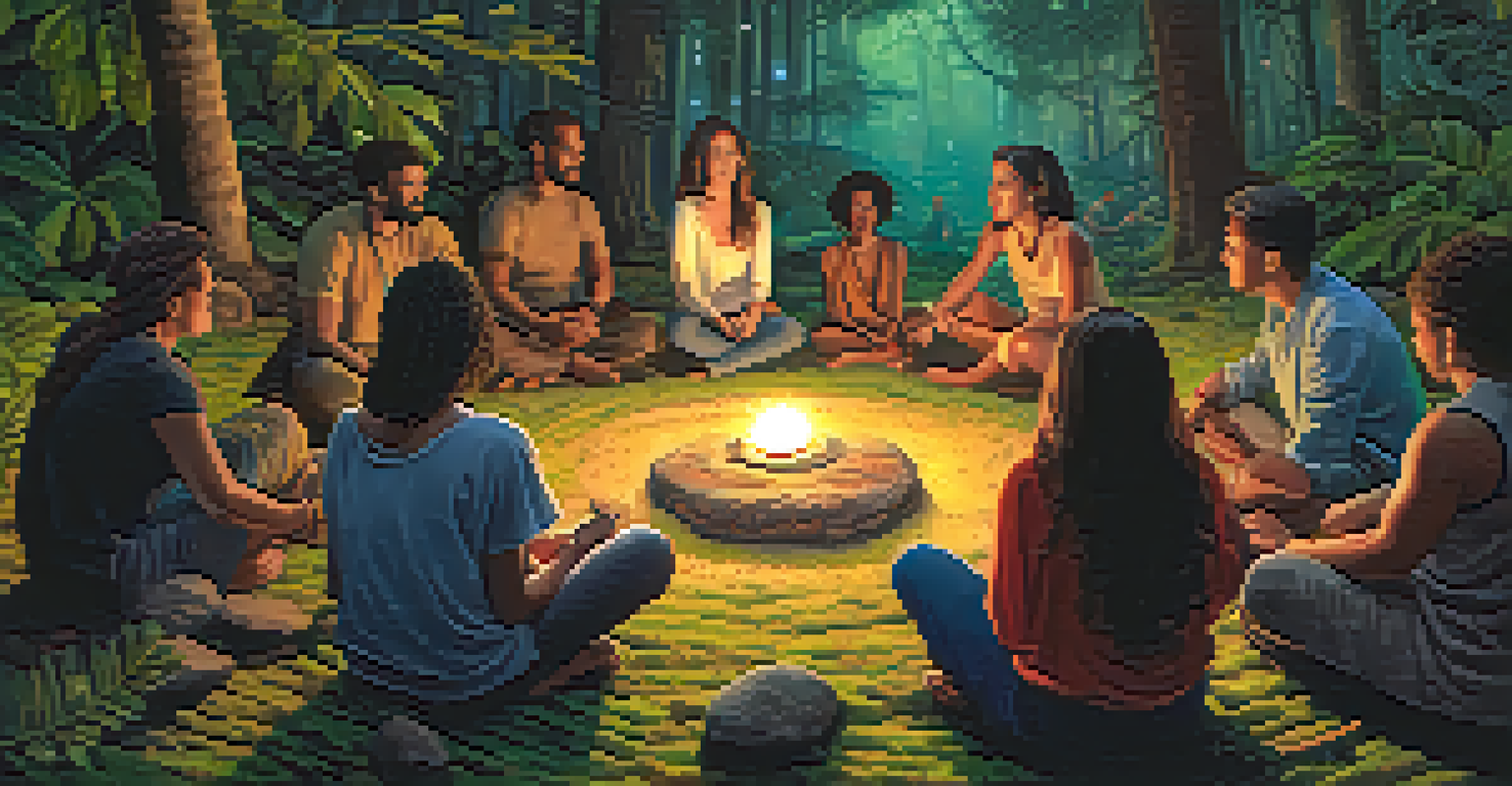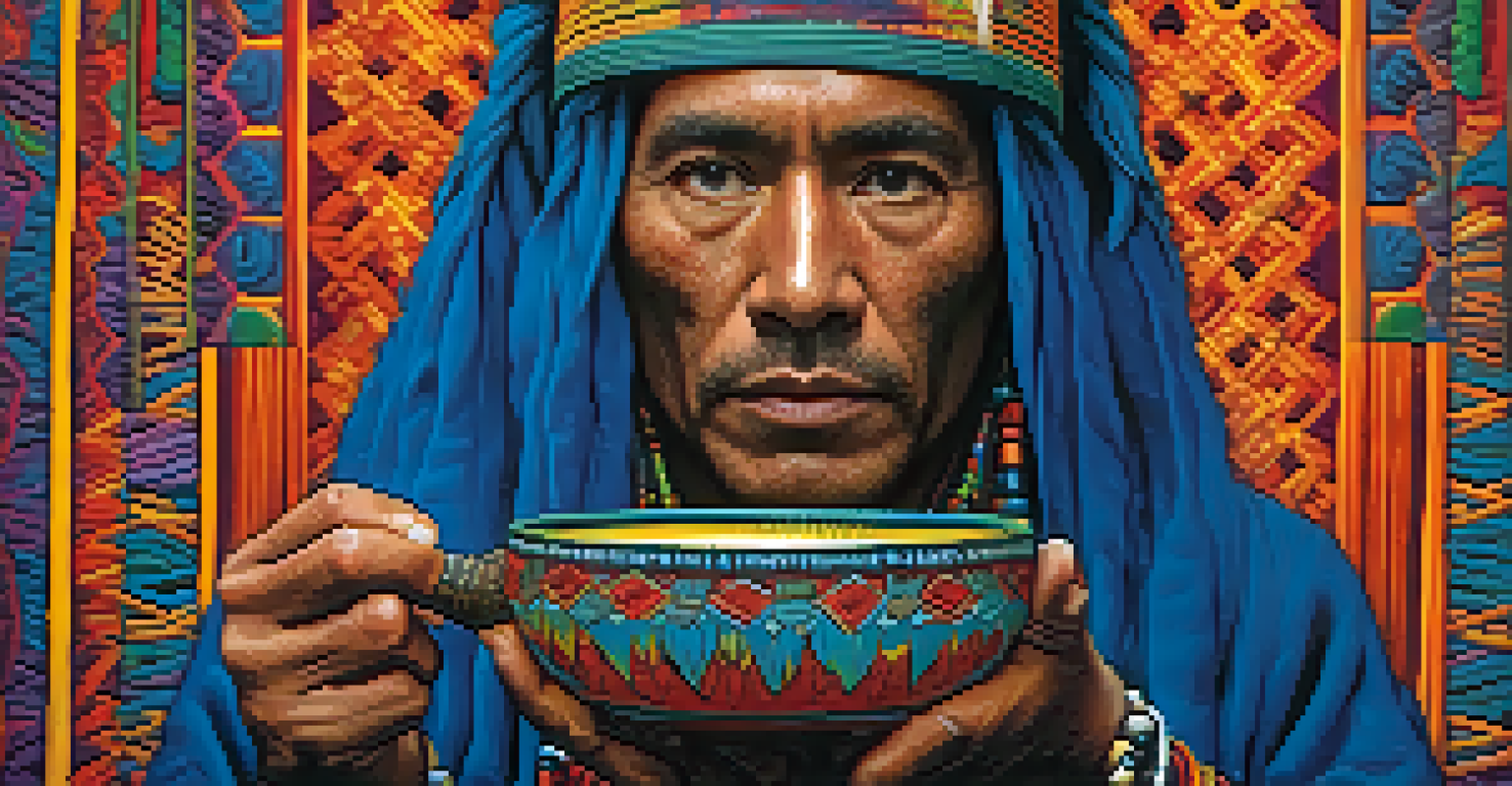Understanding Ayahuasca: A Guide to Cultural Sensitivity

What is Ayahuasca and its Origins?
Ayahuasca is a traditional Amazonian brew made from the Banisteriopsis caapi vine and the Psychotria viridis leaf. This potent combination has been used for centuries by indigenous tribes in the Amazon basin for spiritual and healing purposes. The brew is known for its psychoactive properties, often leading users on profound introspective journeys.
The experience of Ayahuasca is not just a journey into the mind but a deeper exploration of the spirit and the interconnectedness of all life.
The origins of Ayahuasca are deeply rooted in the cultures of South America, particularly among the Quechua and other indigenous peoples. It is not merely a hallucinogenic drink; it holds significant cultural and spiritual meaning, often utilized in ceremonial settings for guidance and healing. Understanding these roots is crucial for anyone interested in experiencing Ayahuasca.
In recent years, Ayahuasca has gained popularity outside of its native regions, drawing attention from spiritual seekers and wellness enthusiasts alike. However, this growing interest raises important questions about cultural appropriation and ethical use, making it essential to approach the practice with respect and understanding.
The Role of Shamans in Ayahuasca Ceremonies
Shamans play a vital role in Ayahuasca ceremonies, acting as guides and facilitators for participants. They are often seen as spiritual leaders within their communities, possessing extensive knowledge of the brew and its effects. Their expertise ensures that the experience is safe, meaningful, and respectful of traditional practices.

During ceremonies, shamans use songs, known as 'icaros,' to invoke healing and guide participants through their journeys. These songs carry deep cultural significance and are often passed down through generations. The presence of a shaman helps create a sacred space, allowing participants to connect more profoundly with the experience.
Ayahuasca's Cultural Significance
Ayahuasca is not just a hallucinogenic brew; it embodies deep cultural and spiritual traditions within indigenous Amazonian communities.
It's important for outsiders to recognize the extensive training and knowledge that shamans possess. Approaching such ceremonies without a shaman can lead to misunderstandings and potential harm, both physically and spiritually. Respecting the role of shamans is essential for anyone seeking to engage with Ayahuasca responsibly.
Cultural Appropriation vs. Cultural Appreciation
As Ayahuasca becomes more popular in Western cultures, the lines between cultural appropriation and appreciation can blur. Cultural appropriation refers to taking elements from a culture without understanding or respecting its significance. This is particularly concerning when it comes to sacred practices like Ayahuasca ceremonies.
Respect for indigenous cultures is essential in understanding and engaging with their sacred practices, ensuring that we honor their traditions as we embark on our own journeys.
On the other hand, cultural appreciation involves acknowledging and honoring the traditions and beliefs of another culture while participating in them respectfully. This means doing your homework—learning about the customs surrounding Ayahuasca and recognizing its cultural significance.
Finding this balance is crucial for anyone looking to experience Ayahuasca. Engaging with the culture respectfully not only enriches your experience but also honors the traditions that have been maintained for centuries. It’s about fostering genuine connections rather than simply seeking a trendy experience.
Preparing for an Ayahuasca Experience
Preparation is key to having a meaningful Ayahuasca experience. This often involves physical, mental, and spiritual readiness. Participants are typically encouraged to follow a specific diet, often referred to as 'dieta,' which helps cleanse the body and mind in the days leading up to the ceremony.
Mental preparation is just as important. This includes setting intentions for the experience and reflecting on what you hope to gain. Understanding that Ayahuasca can bring up difficult emotions and memories is crucial, as it prepares participants to confront whatever arises during the journey.
Role of Shamans in Ceremonies
Shamans serve as essential guides in Ayahuasca ceremonies, using their extensive knowledge and songs to create a safe and meaningful experience.
Additionally, finding a reputable retreat or facilitator is essential. Researching the background and practices of those leading the ceremony ensures that you are in a safe and respectful environment. Ultimately, thoughtful preparation can enhance the spiritual journey and help participants navigate their experiences with greater ease.
What to Expect During an Ayahuasca Ceremony
An Ayahuasca ceremony typically begins with a communal gathering where participants share their intentions. This creates a sense of community and sets the tone for the experience. Once the brew is consumed, individuals may begin to feel its effects, which can vary widely from person to person.
Common experiences during the ceremony include vivid hallucinations, deep emotional releases, and profound insights. Some people may find themselves confronting past traumas, while others may experience feelings of love and connection with the universe. It’s important to remember that no two journeys are alike, and each person's experience is valid.
Throughout the ceremony, the shaman guides participants with their songs and energy, helping to create a safe space. Participants are encouraged to surrender to the experience, embracing whatever arises. Knowing what to expect can alleviate anxiety and enhance the overall experience, making it a transformative journey.
Integrating the Ayahuasca Experience
Integration is a crucial aspect of the Ayahuasca experience. After the ceremony, individuals often take time to reflect on what they encountered during their journey. This process can help translate the lessons learned into everyday life, allowing for personal growth and transformation.
Many participants find it helpful to share their experiences with others, whether through group discussions or personal journaling. This can provide clarity and deeper understanding of the insights gained during the ceremony. Additionally, seeking guidance from professionals or support groups can aid in the integration process.
Ethics of Ayahuasca Usage
Engaging respectfully with Ayahuasca requires an understanding of cultural appropriation versus appreciation to honor its sacred origins.
Ultimately, the insights gained from Ayahuasca can lead to lasting changes in behavior and perspective. Fostering a supportive environment for integration helps ensure that the experience contributes positively to one’s life, reinforcing the importance of cultural sensitivity and respect throughout the journey.
The Future of Ayahuasca and Cultural Sensitivity
As Ayahuasca continues to gain popularity globally, the importance of cultural sensitivity cannot be overstated. It’s essential for practitioners and seekers to remain mindful of the traditions and beliefs surrounding this sacred brew. This awareness helps protect the cultural heritage of indigenous communities while promoting respectful engagement.
The future of Ayahuasca depends on how well we navigate the balance between interest and respect. Supporting indigenous communities and prioritizing ethical practices can ensure that this powerful medicine is used in ways that honor its origins. Engaging with local cultures, understanding their needs, and promoting sustainable practices are vital steps in this direction.

In conclusion, understanding Ayahuasca requires a commitment to cultural sensitivity and respect. By valuing the traditions and practices of indigenous peoples, we can create a more profound and enriching experience for everyone involved. After all, the journey with Ayahuasca is not just personal; it's a shared experience that transcends cultures.